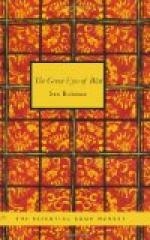A heavy Persian carpet was spread upon the floor and the windows were draped with some kind of brightly colored Madras. Tastefully-framed water-colors hung upon the wall. There was a quaint cabinet in the room, too; a low cushioned settee and two armchairs. In the center was a table upon which stood a lamp with a large mosaic shade. Two high-backed chairs were set to the table—and the table was laid for supper! A bottle of wine stood in an ice-pail, in which the ice had long since melted, and a tempting cold repast was spread. The table was decorated with a bowl of perfect white roses. The silver was good; the napery was snowy.
Like a fool I stood gaping at the spectacle, until, noting the direction of Gatton’s glance, I turned my attention to the mantelpiece upon which a clock was ticking with a dull and solemn note.
Standing beside the clock, in a curious carved frame, was a large photograph of Isobel!
CHAPTER VI
THE VOICE
“This is where the mystery centers,” said Gatton.
I made no reply, for I had not yet recovered from the shock of that discovery in the deserted supper room. It was so wholly unexpected and yet it so cruelly confirmed the Inspector’s undisguised suspicions that it seemed to me to have created a sort of impalpable barrier between us. Of this Gatton was evidently conscious. He endeavored to arouse my interest in the inquiries which he was conducting in the garage, but for long enough I saw nothing of the place in which we stood; I could only see that photograph smiling at me inquiringly through a haze of doubt, and my companion’s words reached me in a muffled fashion. Finally, however, I succeeded in rousing myself from this dazed condition, and confident as ever that Isobel was innocent of all complicity in the matter:
“The presence of the photograph,” I said, “takes us a step further. Don’t you see, Inspector, that this is a deeply and cunningly laid trap? What I had taken for a series of unfortunate coincidences I perceive now to be the workings of an elaborate scheme involving perfectly innocent people in the crime.”
“H’m,” said Gatton doubtfully; “it may be as you suggest; at any rate it is a new point of view and one which I confess had not occurred to me. There is one witness who can clear up any doubt on the subject.”
“You mean Marie?”
“Exactly. She will lie, beyond doubt, but we shall find means to reach the truth.”
“Would it not be advisable, Inspector,” I asked excitedly, “to make sure of her at once?”
Gatton smiled grimly, and:
“Marie would have to make herself invisible to evade Scotland Yard now,” he replied. “She is being watched closely. But,” he continued, “what do you make of these marks on the door?”
We had reclosed the garage door and now were standing immediately inside. The marks to which my companion had drawn my attention were situated high up near the roof.




